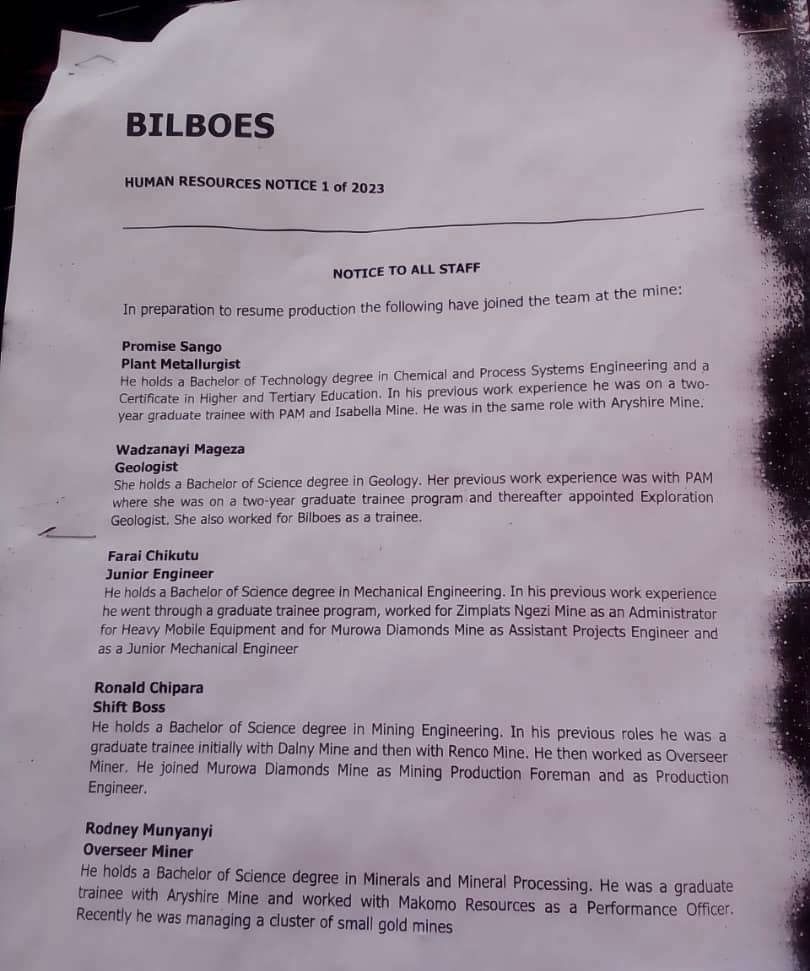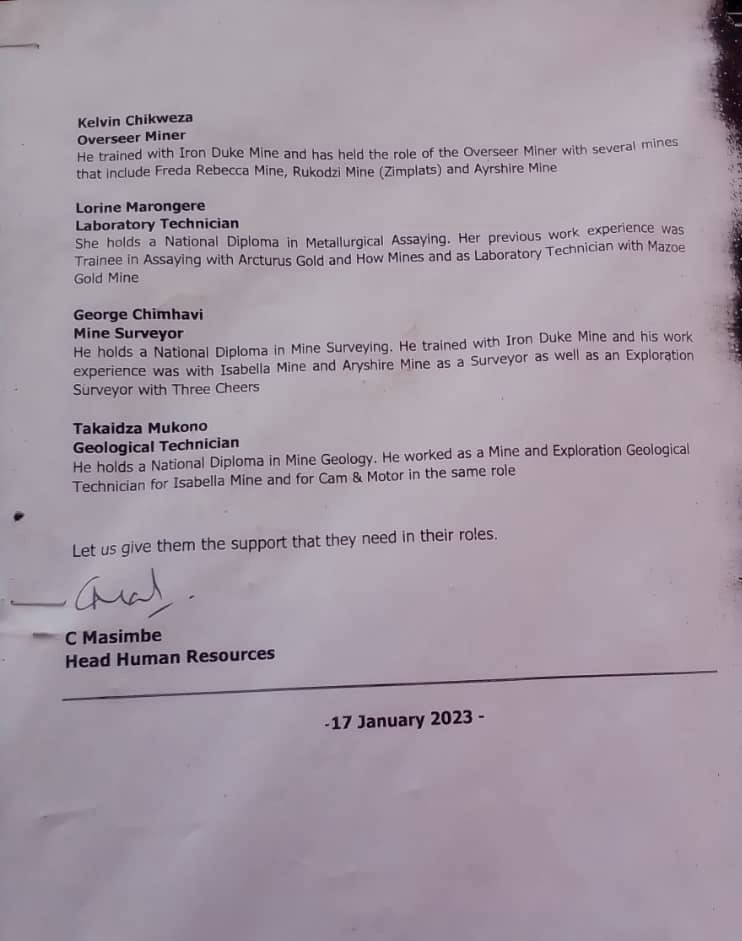Locals in Siganda, Matabeleland North, have accused management at Isabella Gold Mine of recruiting staff from other provinces at the expense of locals.
Isabella Gold Mine, also known as Bilboes, together with McCays and Bubi Mines, is located in Village 10 of Ward 8, with activities extending into Wards 6, 9, 16, 20, and 21.
Isabella was placed under care and maintenance in 2021, pending the entry of new investors.
When Caledonia Mining Corporation Plc stepped in, the mine reopened in January of this year.
Isabella’s management has denied the accusations, stating the company’s recruitment is based on competency and technical skills, which is a guiding philosophy for future mining operations.
Locals, on the other hand, informed CITE that when the mine reopened, they were shocked to see the majority of jobs had been filled by individuals from other provinces.
They regarded the hiring as discriminatory, adding this was also evident in managerial positions, where they alleged: “only two or so Ndebele individuals were among the 20 or so Shona managers hired.”


“Job interviews were done in Harare yet the mine is based in Matabeleland North,” claimed the villagers who accused the mine’s management of sidelining local youths.
Villagers also claimed there were inequalities in earnings and remunerations, with non-locals allegedly receiving more while accommodation at the mine was also reserved for them.
“Locals hired permanently have short-term contracts, while female workers have no maternal leave, with one woman having to abort her pregnancy,” they alleged.
Reached for comment, mine manager, Shingirai Chimhanda, indicated that key mining skills were not readily available in the area, which is a challenge not unique to Isabella but generally for all mining operations countrywide.
“The mine has two approaches to recruitment. Management and technical skills – these are not readily available in the local area, as such the recruitment is through advertisement in the national press and selection is through interviews by a panel,” Chimhanda said, adding that general and non-technical skills are recruited from the community and surrounding areas and may be on rotational, fixed term contracts, short term or casual basis.
“This allows more people to work, by nature mine operations tend to have various tasks that require short term engagement.”
Chimhanda disputed tribalism claims, saying employment statistics of tribal groups were not static.
“We track as families tend to migrate and settle anywhere especially following the land reform programme, individuals have moved regions,” he said.
Chimhanda further stated that in the past, mining at Isabella was mostly based on Oxide ore deposits, which were processed using the heap leach technique.
Between 2010 and 2020, Bilboes conducted an exploration that identified sulphide resources that require a different processing procedure than oxidised resources.
“Bilboes conducted a feasibility study for the Sulphide project, which was completed in 2020.”
According to the feasibility assessment, the company needed to invest up to $300 million to build new mines at Isabella, McCays, and Bubi Mines.
“The bringing in of a new investor to fund the new mines was affected by Covid-19 and was only completed on January 6, 2023, when Caledonia Mining Corporation Plc acquired Bilboes,” he said.
Chimhanda said when the oxide resources were exhausted, the mines were put on care and maintenance in 2021, awaiting the arrival of new investors.
“The mines were vacated except for employees who were all assigned to security positions, irrespective of their skill and positions, to safeguard the mine assets,” Chimhanda said.
“Following the deal with Caledonia, funding to restart operations on a small scale level processing remnant Oxide ore resource was secured,” he said, noting recruitment took place to increase staff from 78 employees to 185 as of March 2023.
“Of these re-engaged most had been laid off following the undertaking by the mine that they will be given priority for employment when production resumes. This was implemented.”
The mine manager said the bigger Sulphide project will only come online in about three years’ time, where employment will “increase considerably.”
“With the scale of operations planned for Bilboes Mines, the Community Social Responsibility (CSR) plan will include education, more specifically technical skills. The company is planning an innovation box plant for extracting gold and as of now the pilot is being manned by local young people drawn from the community. The plan is to replicate this to a bigger number and develop local skills.”
As for remuneration, Chimhanda said this was guided by the NEC Mining regulations and Collective Bargaining Agreement as negotiated by the industry and was “competitive to retain the skills.”
He said the mine has inadequate accommodation units and on a need basis, the units were allocated to non-local employees.
Chimhanda added the mine has considered females for employment and had 15 as at March 2023, of which their records indicated no request for maternity leave.
“The last maternity leave was in 2021. The mine has a clinic and a visiting doctor that caters for all the health needs of the employees and their immediate families. The mine has no record for any grievances in this area. Further the mine is guided by the provision of the Labour Act and strives to be bound by it,” he said.
Meanwhile, locals said the management also purchased Motapa mine, where their children, who were unable to work at Isabella, had been doing small-scale mining activities there but had been banned with police officers protecting the area.
However, the mine manager stated that Motapa has a legal registered mining license and all necessary precautions were taken to protect the mining lease.
“Part of this included removal of illegal operators on the mining lease. The business plan is to develop a mining operation guided by the relevant regulations and statutes. As the mine operates it will create jobs locally and nationally, as well as contribute to the minerals extraction value chain for the country. Motapa will also have its own CSR plan that will also benefit the local community and the region in general,” he said.
Although Chimhanda could not guess the source of the complaints, he acknowledged that the mine’s communication should be improved.
“We need to engage our stakeholders more so that we keep them informed of development at the mine. We must work on closing this information gap,” he said.

